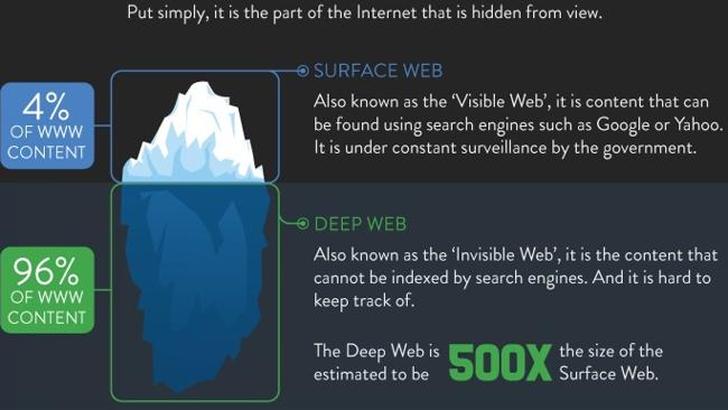The Deadly Internet – The Deep, Dark & Dirty Web
 The African-American Cyber Report is examining what has become known as the deep or dark web. This is the first in a series of articles is intended to reveal to African-Americans the hidden, terrifying and illegal assortment of products and services you can buy on the dark web. We will also examine the dangers the dark web poses to women and children.
The African-American Cyber Report is examining what has become known as the deep or dark web. This is the first in a series of articles is intended to reveal to African-Americans the hidden, terrifying and illegal assortment of products and services you can buy on the dark web. We will also examine the dangers the dark web poses to women and children.
Hackers lurking in cyber space can threaten your bank account, your identity, your phone and other technology and even your home and auto. But the Internet has become a place that is far darker and far deadlier. The Internet has become a place where no matter what you want to buy it can be had. A place where nothing is sacred or protected. In this darkness the Internet is anonymous. A person with minimal skill can hide a criminal operation amongst the billions of websites and do whatever they please with almost no scrutiny or fear of the law. A place where well meaning technology permits the untraceable exchange of currency. Its the deep, dark or dirty web.
What is the dark web?
Lets begin by accepting this simple fact; the Internet you know is a microscopic percentage of the total web. As the average Internet user you are probably using Google, Bing or Yahoo search engine. And you probably use various social media websites and free email accounts like Gmail. Except for work you use the same sites and do the same thing online almost every time you sit in front of a computer. The average person doesn’t visit more than 20-25 websites regularly.
But there are literally billions of websites and trillions of webpages. And among these websites you can find almost everything you could imagine from rare artifacts to highly suspect and little researched information. But deep, deep in cyberspace are websites that are not looking for publicity or high visitor traffic. These websites are not selling ad space or giving away prizes. But you can buy human body parts, drugs, guns and children for sex. This is not imaginary or a joke.

Source: www.news.com.au
In the dark can be found a subset of sites that that aren’t accessible from a regular browser at all. These are called darknets and have URLs that don’t end in the traditional host suffixes you are used to like .com,.net, .org,.us .fr, .eu, and so on. These dark websites require special browsers to even find.
What is the Tor network?
The Tor network is not hard to understand. Its an anonymous web browser. That means it’s simply a network of servers that bounce your Internet search and traffic around the web making it extremely difficult for anyone to figure out who you are or where you are. The Internet is a network of networks and there are probably hundreds of millions of servers online. Some public and well known and many private and unknown. Using the Tor browser allows you to visit these hidden places. But take note; Tor makes it tough but not impossible to find you. I have seen motivated law enforcement agencies invest the time, money and technology to find a criminal when they really want to. Don’t forget that. Other anonymous or dark web browsers include I2P and Freenet
The Tor network is probably the best known darknet web browser. That infamy comes from sites such as the notorious Silk Road black market. Silk Road, created as an illegal drug marketplace was busted by the FBI. Its founder, Ross Ulbricht, also known as Dread Pirate Roberts, was arrested, his fortune in bitcoins seized and is currently on trial. Even though the Silk Road and other drug markets was busted others quickly sprnng up to take their place.
Website addresses on the Tor network follow the form of a random string of letters followed by the .onion suffix. A dark web address may look like this link on a deep web directory: allyour4nert7pkh.onion. You can only access these links using the Tor browser you can download here. To visit a link on the dark web, you must either know the full address or find it on a deep web directory such as Hidden Wiki, Pastebin or All You’re Wiki or check out Reddit, where many threads are devoted to discussions about dark web business.
How do you get to the dark web? Its not as hard as you may think. You can search “Hidden Wiki” with the Tor browser to hit its surface web address. You can go from there to the Deep Web (.onion) version that holds dozens of links categorized as commercial services, marketplaces, financial services and of course erotica.
While the dark web is a frightening market place of sex, drugs and weapons there are also useful tools for journalists, researchers, or thrill seekers. But before you go strolling through the dark web just out of curiosity remember this. Using the Tor browser is not illegal but can arouse suspicion with the law. Law enforcement knows many illegal transactions usually begin in the hidden corners of the dark web. These transactions often move out in the open for retail, private dialoging, or in-person meetups. That’s how most people get caught by law enforcement officials. Another thing to keep in mind is that this is a place where criminals work. You could find yourself in contact with some extremely dangerous people whether you are careful or not. There is also the potential for scams, computer viruses, police stings and God knows what else.
What can you buy and sell on the dark web?
Greg Virgin founder of cyber security company RedJack, said “People have estimated that more than 70 percent of the activity on the Dark Net is illegal.”
Besides the typical selection of counterfeit watches, jewelry, fashions and electronics much of the illegal activity involves money; counterfeit cash, in many cases. Some sites provided extensive listings for euros, hacked PayPal accounts, cloned credit cards with PINs, and more. Other sites offered corporate account numbers for sale. Yet another site showed images off stacks of counterfeit $20 bills selling them 10 bills for $80. Users even offered advice on how to exchange the phony cash. You can also find websites selling drugs of all types. You can everything from run of the mill marijuana to cocaine, crack and designer drugs like Ecstasy. One site offered drugs to induce miscarriages.
Truly darker sites are used to support terrorism by seeking donations to recruit jihadists in the United States. “…to establish a new Islamic front both in the United States and around the world.” Other websites promoted racist and anti-government propaganda with a email sign up form for the coming “revolution.”
Murder is another big business on the dark web with one site seeking to crowd fund assassinations. Another website makes it easy to obtain high-powered firearms. Of course, no questions are asked and no background checks.
When Virgin isn’t running RedJack.com he works with the International Justice Mission to find and rescue children being bought and sold on the dark web as sexual slaves. Virgin said because of his work, he believes arrests are coming in the near future. “We believe we’ve found dozens of victims, that there’s a strong possibility for rescue,” he said.
Retired FBI executive assistant director agent Shawn Henry spent 15 years leading cyber investigations around the world. “Imagine from a law enforcement perspective the challenge in identifying people who have never gotten together physically, who live in five separate countries,” Henry said, adding that the dark web is a nightmare for law enforcement.
Henry pointed out that the dark web is also the source of all the high-profile hacks of the past year. Some of the country’s largest retailers including Target, Home Depot, Chase, Neiman Marcus have all been broken into. Even the U.S. government database holding personal information for employees with sensitive security clearance was not immune to hacker intrusion.
“Can you protect the network from being breached? That’s out the window now,” Henry said. “We need to change the paradigm here and it needs to be: how soon after an adversary makes access do we detect them.”
Henry’s biggest fear is hackers, working through the anonymity of the dark web, attacking power plants and financial systems; cyber terrorism.
“There are actually terrorist groups that are calling for electronic jihad,” Henry said. “What if the lights go out for a week, two weeks, a month? How do we handle that as a nation?” He said he believed it “absolutely” possible.
What is Bitcoin?
 Bitcoin is a digital currency that was created in 2009 by a mysterious person using the alias Satoshi Nakamoto. Transactions are conducted without bank or other transaction middle men that can trace a purchase. Much like cash there are no transaction fees and no need to give your real name. A Bitcoin wallet can be on a person’s smartphone, tablet or held somewhere online. More and more legitimate merchants are beginning to accept the digital currency allowing the consumer to buy everything from web hosting services to pizza or even manicures. On the dark web it can buy guns, drugs, sex and murder.
Bitcoin is a digital currency that was created in 2009 by a mysterious person using the alias Satoshi Nakamoto. Transactions are conducted without bank or other transaction middle men that can trace a purchase. Much like cash there are no transaction fees and no need to give your real name. A Bitcoin wallet can be on a person’s smartphone, tablet or held somewhere online. More and more legitimate merchants are beginning to accept the digital currency allowing the consumer to buy everything from web hosting services to pizza or even manicures. On the dark web it can buy guns, drugs, sex and murder.
“Bitcoin is a virtual currency that obscures the people doing the transaction,” said Bruce Upbin, a managing editor for Forbes. “It’s a piece of code that’s shared between two parties to replace currency.”
Anyone can buy bitcoin, but it’s not cheap. One bitcoin is about $300, although it’s been as high as $1,000.
Now you know.


